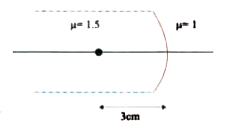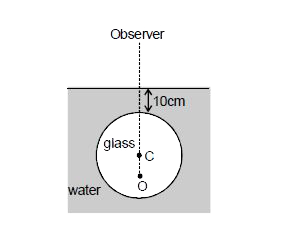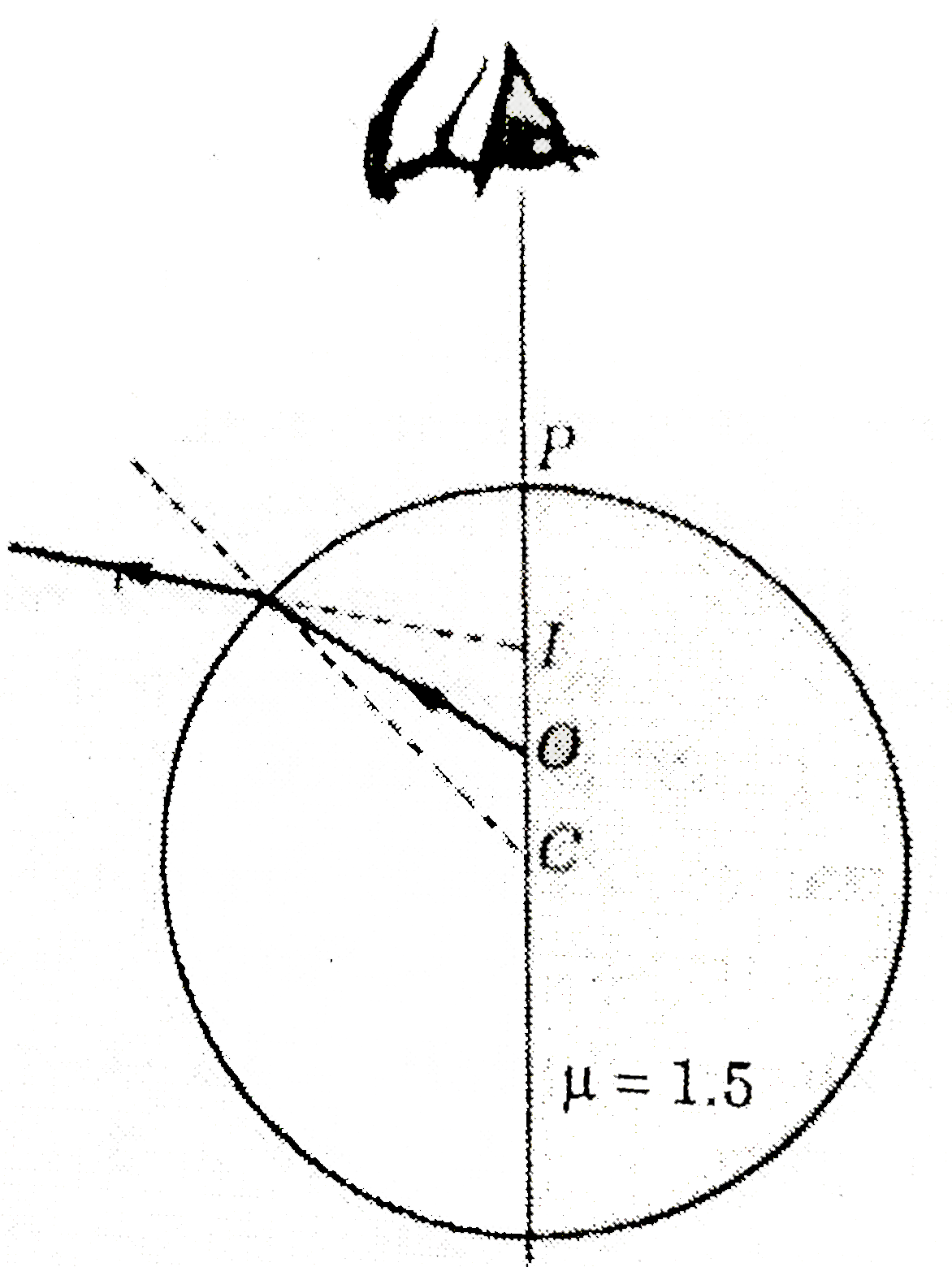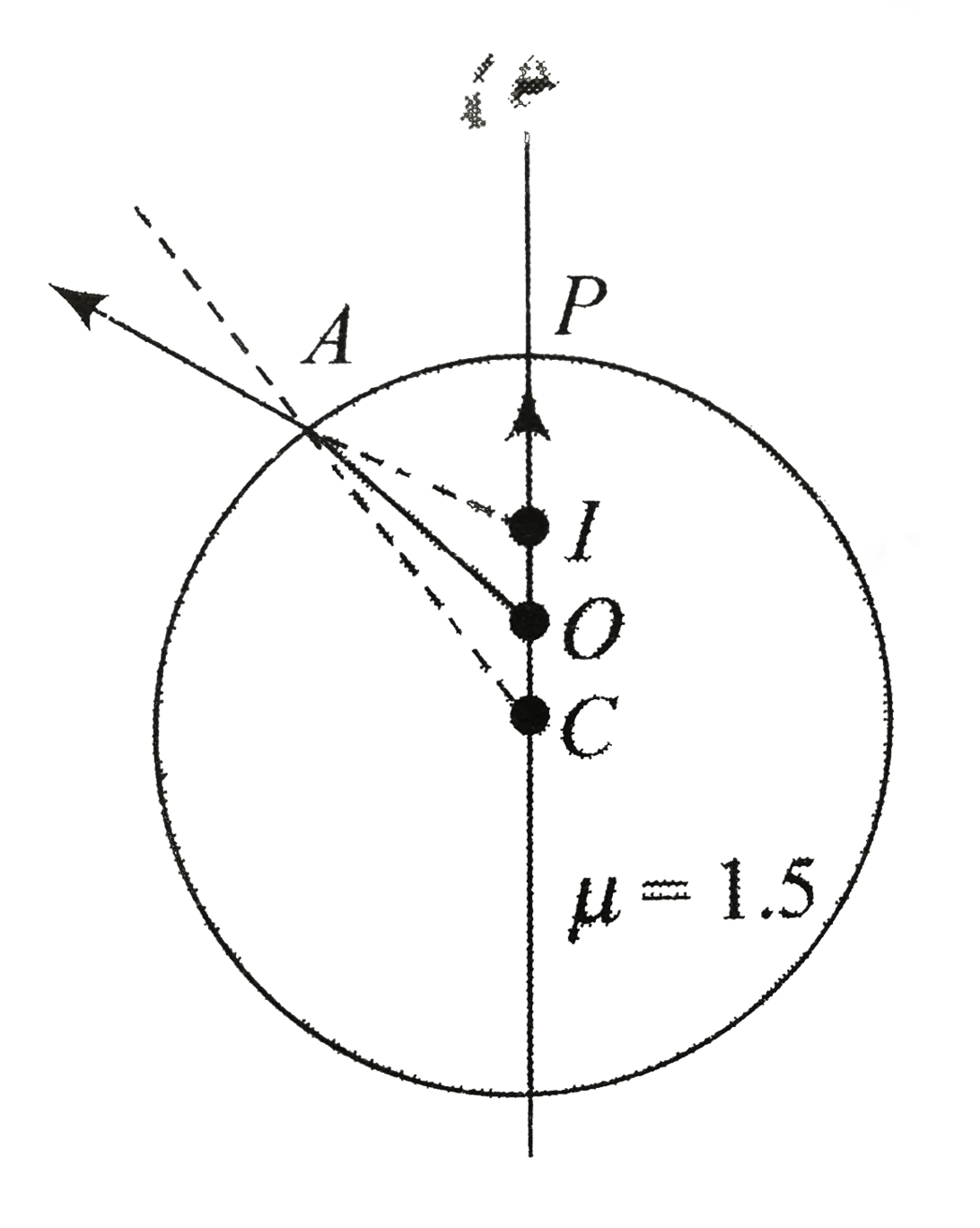An air bubble in a glass sphere (μ=1.5) is situated at a distance 3cm from a convex surface of diameter 10cm. At what distance from the surface will the bubble appear ?
In case of refraction from curved surface μ2v−μ1u=(μ2−μ1R
(a) " " μ1=1.5,μ2=1,R=−5cmandu=−3cm⇒1v−(1.5)(−3)=1−1.5(−5)⇒v=−2.5cm the bubble will appear at a distance 2.5cm from the convex curved surface inside the glass.
(b) μ1=1.5,μ2=1,R=5cmandu=−3cm⇒1v−(1.5)(−3)=1−1.5(5)⇒v=−1.66cm
the bubble will appear at a distance 1.66 cm from the concave curved surface inside the glass .
Note: If the surface is plane then R→∞
case(a) or (b) would yield 1v−(1.5)(−3)=(1−1.5)∞⇒v=−2cm
Topper's Solved these Questions
- GEOMETRICAL OPTICSBOOK - ALLENCHAPTER - GEOMETRICAL OPTICSEXERCISE - SOME WORKED OUT EXAMPLES
84 Videos
- GEOMETRICAL OPTICSBOOK - ALLENCHAPTER - GEOMETRICAL OPTICSEXERCISE - EXERCISE -01
65 Videos
- CURRENT ELECTRICITYBOOK - ALLENCHAPTER - CURRENT ELECTRICITYEXERCISE - All Questions
427 Videos
- GRAVITATIONBOOK - ALLENCHAPTER - GRAVITATIONEXERCISE - EXERCISE 4
9 Videos
Similar Questions
An air bubble in a glass sphere (μ=1.5) is situated at a distance 3cm from a convex surface of diameter 10cm. At what distance from the surface will be the bubble appear ?
View SolutionAn air bubble in glass (μ=3/2) is situated at a distance of 2 cm from centre of sphere of diameter 10 cm. Locate the image of bubble from (a) nearer surface and (b) farther surface.
View Solution
Knowledge Check
An air bubble in glass (μ = 1.5) is situated at a distance 3 cm from a convex surface of diameter 10 cm as shown. The distance from surface at which the image of bubble appears is
 A2.5cmB5cmC4cmD1.5cm
A2.5cmB5cmC4cmD1.5cmA point object is situated in air at a distance of 20 cm from a convex refracting surface of 5cm radius. The position of the iamge is [μ=1.5]
A40 cmB30 cmC25 cmD15 cmThere is a small air bubble inside a glass sphere (μ=1.5) of radius 5 cm. The bubble is 7.5 cm below the surface of the glass. The sphere is placed inside water (μ=43) such that the top surface of glass is 10 cm below the surface of water. The bubble is viewed normally from air. Find the apparent depth on the bubble.
 A15 cm below the surface of waterB10.5 cm below the surface of waterC16.66 cm below the surface of waterD13.5 cm below the surface of water
A15 cm below the surface of waterB10.5 cm below the surface of waterC16.66 cm below the surface of waterD13.5 cm below the surface of water
Fig shows a small air bubble inside a glass sphere (μ=1.5) of radius 10 cm. the bubble is 4.0 cm below the surface and is viewed normally from the outside. Find the apparent depth of the bubble.

View SolutionAn air bubble is seen inside a solid sphere of glass (n=1.5) of 4.0cm diameter at a distance of 1.0cm from the surface of the sphere (on seeing along the diameter). Determine the real position of the bubble inside the sphere.
View SolutionThere is a small air bubble inside a glass sphere (μ=1.5) of radius 10 cm. The bubble is 4.0cm below the surface and is viewd normally from the outside. Find the apparent dipth of the bubble.

View SolutionA point mass is placed on the principal axis at 0 at a distance of 10cm from convex refracting surface of the pole.Find the image distance (in cms) from pole of refracting surface. (Radius of the spherical surface is R =30cm) n1=1.5
View SolutionAn air bubble inside a glass slab (µ=1.5) appears 6 cm when viewed from one side and 4 cm when viewed from the opposite side. The thickness of the slab is
View Solution